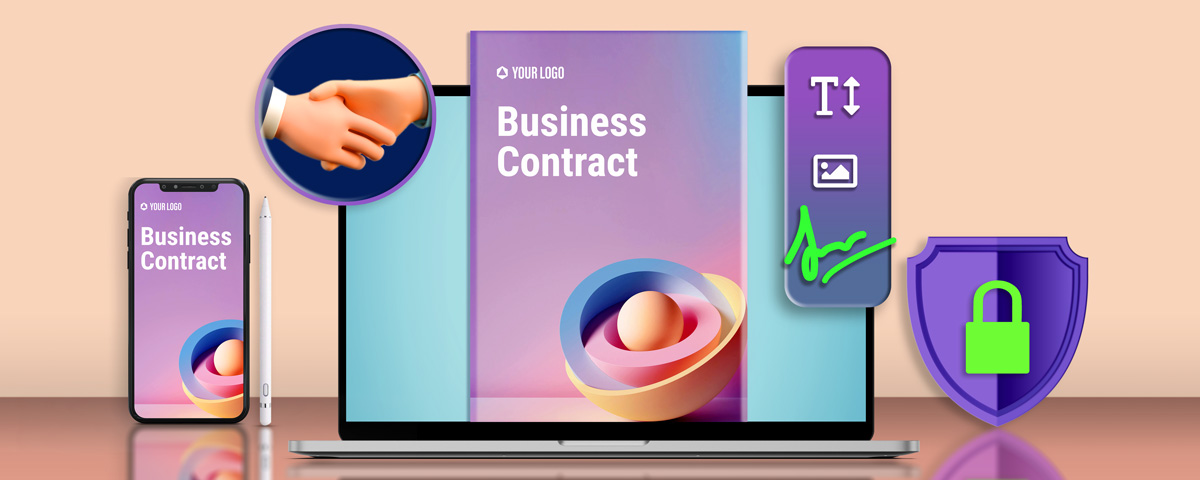In today’s digital age, contracts are no longer confined to physical paper documents. Digital contracts, executed and stored electronically, offer numerous advantages. They enhance efficiency, reduce costs, and provide greater security and accessibility. Whether you’re an entrepreneur, a business owner, or simply navigating everyday agreements, this comprehensive guide will empower you to create legally binding digital contracts with confidence.

Image: www.revv.so
Understanding Digital Contracts
A digital contract, also known as an electronic contract or e-contract, is a legally enforceable agreement between two or more parties that is executed and stored electronically. It may take the form of an email, a web-based platform, or a specialized software program. Digital contracts carry the same legal weight as traditional paper contracts and are recognized by courts worldwide.
The primary benefits of digital contracts lie in their convenience and cost-effectiveness. They eliminate the need for printing, mailing, and physical storage, saving both time and money. Furthermore, digital contracts allow for effortless tracking, version control, and instant access to all parties involved. Their enhanced security features, such as digital signatures and encrypted storage, protect against fraud and tampering.
Crafting a Digital Contract
- Identify the Parties:
Clearly state the full names and addresses of all parties entering into the contract. Ensure that the individuals signing the contract have the legal authority to do so.
- Define the Purpose:
Outline the specific purpose and intent of the contract, including the goods or services being provided, the payment terms, and any other relevant details.
- Specify the Terms and Conditions:
Thoroughly describe the rights and responsibilities of each party. This may include payment schedules, delivery dates, intellectual property ownership, and termination provisions.
- Incorporate Legal Clauses:
Include essential legal clauses such as governing law, dispute resolution mechanisms, and liability limitations to protect the interests of all parties.
- Obtain Digital Signatures:
A digital signature serves as the electronic equivalent of a handwritten signature. Each party must digitally sign the contract using a secure method, such as a digital certificate or electronic signature solution.
- Store Securely:
Store the digital contract in a secure location, such as a cloud storage service or a specialized e-contract management system. Ensure that all parties have access to the contract and that it is backed up regularly.
Legal Considerations
-
Validity: Digital contracts must meet the same legal requirements as traditional contracts to be considered valid. They require a genuine offer, acceptance, consideration, and capacity to contract.
-
Authentication: Digital signatures provide the necessary authentication by verifying the identity of the parties signing the contract.
-
Electronic Commerce Laws: Many jurisdictions have enacted specific electronic commerce laws to address the validity and enforceability of digital contracts.
-
Jurisdiction: Determine the applicable jurisdiction that will govern the interpretation and enforcement of the digital contract.
-
Seek Legal Advice: When dealing with complex or high-value contracts, it is always advisable to consult with an attorney to ensure the legality and enforceability of your digital contract.

Image: webonboarding.com
How To Make A Digital Contract
https://youtube.com/watch?v=2zBZEPjx_DQ
Conclusion
Digital contracts offer a plethora of advantages, revolutionizing the way we enter into agreements. By carefully following the steps outlined in this guide, you can create legally binding digital contracts that protect your interests and facilitate seamless collaboration. Remember, understanding the legal considerations and seeking professional advice when necessary is crucial to ensure the validity and enforceability of your digital contracts. Embrace the digital transformation and reap the benefits of efficient and secure contracting in today’s interconnected world.







